Guess which legal drama grabbed the nation’s attention
While none of the live-streamed real-life legal battles in the Federal Court of Australia are as outlandish as Boston Legal, not everyone loves this new media development.
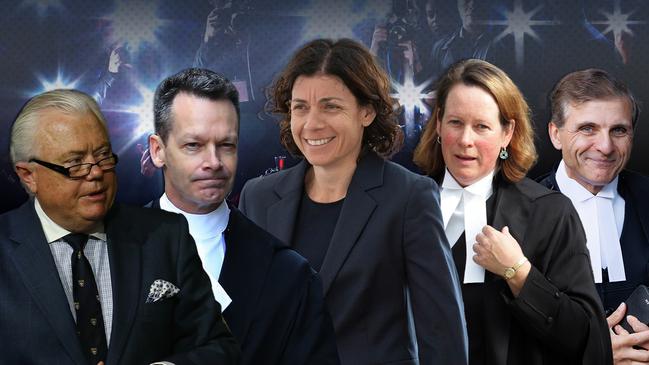
During a defamation trial in March 2024, Sue Chrysanthou SC began her cross-examination of a former paramedic, who became an amputee after a terrible accident, by asking whether he had been watching any of the live streaming of the case before stepping into the Federal Court witness box.
“Yes, some of it,” said the man, who had travelled from the US to give evidence against her client, Dr Munjed Al Muderis. The esteemed surgeon is suing The Age, The Sydney Morning Herald and 60 Minutes for portraying him as negligent when performing osseointegration surgery, which involves inserting titanium pins to allow for a prosthetic limb.
“What have you had the chance to watch?” Chrysanthou probed.
“Maybe two episodes,” replied the witness.
The man from Oklahoma could be forgiven for confusing proceedings in the legal drama with episodes in a Netflix legal series.
While none of the live-streamed real-life legal battles in the Federal Court of Australia are as outlandish as, say, Boston Legal – the spoof legal drama that featured William Shatner and James Spader – not everyone loves this new media development. However, a good case can be made that Australian justice has become more accessible, better understood and more respected ever since the Federal Court met YouTube.
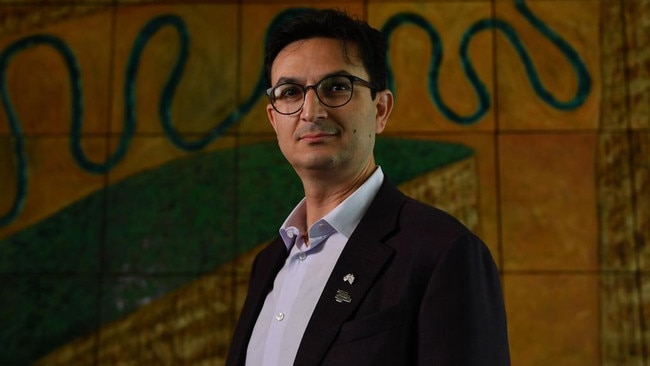
The Federal Court started using YouTube to livestream legal proceedings in early 2022. No more trudging off to court for legal observers and voyeurs. The lawyers, witnesses, judges and legal arguments come to us. Along with some bloopers.
At one point in the Al Muderis case, viewers could see Chrysanthou dropping to the ground, disappearing behind the bar table as if swallowed by a trap door. She hadn’t realised her chair had been moved back. But it’s a great story, the Sydney silk literally busting her arse for her client. She suffered a fracture, diagnosed days later only after her medical client insisted she have an X-ray.
To further the interests of open justice, the Federal Court has live-streamed more than 80 proceedings. Eighty per cent feature the cut and thrust of trials, the other 20 per cent are appeals. With 40 per cent of the top 10 most viewed featuring defamation battles, the arrival of defamation lawyers into pop culture is inevitable. Whether they like it or not. And some don’t like it.
Want to know the top 10 legal dramas?
If the metric were total legal fees, the recent defamation trial involving Ben Roberts-Smith would certainly deserve the “trial of the century” label that it has attracted in the media. In fact, the BRS case doesn’t make the top three in terms of public interest – measured by how many people watched the legal stoush. The biggest legal blockbuster, with a tally of more than 1.2 million court watchers took place one Sunday morning, on January 16, 2022, during the Covid pandemic.
The top biller had a starters advantage: it was the first to be live-streamed on the Federal Court’s dedicated YouTube channel (it had televised proceedings using clunkier technology back in February 2021). There were no high-profile witnesses, not even a silk in sight. And it lasted all of six minutes.
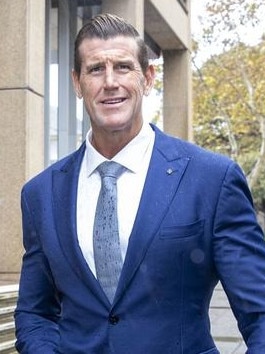

More than a million people tuned in to watch then chief justice James Allsop read out short orders that allowed the Morrison government to boot the highest-ranking and unvaccinated tennis player, Novak Djokovic, out of Australia.
The finer details of administrative law may not stir the juices of the average person. But plenty of Australians – and likely even more Serbs – wanted to know if Djokovic was going to be kicked out of the country on the eve of the Australian Open grand slam.
Each Federal Court judge decides whether a case they are hearing is of sufficient public interest to warrant live streaming. Given there is a difference between what is in the public interest and what interests the public, their determinations have been impeccable.
The 10 most watched live-streamed Federal Court cases canvas important matters, from Covid deportations and vaccine approvals to native title and a stoush about free speech between the eSafety Commissioner and Elon Musk.
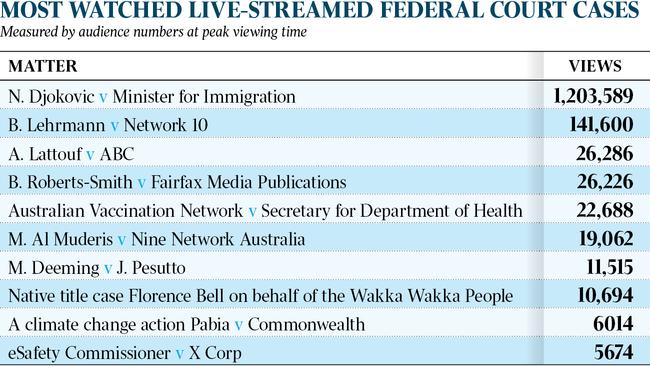
No.2 was, of course, Bruce Lehrmann’s defamation trial. Yet he did not attract the peak audience numbers in his trial – despite it being his first time in a witness box to explain the events on March 23, 2019. Neither was it Brittany Higgins, who had become the face of the #MeToo movement in Australia, nor TV presenter Lisa Wilkinson, despite her starring role in turning a rape allegation into a national scandal.
The highest number of people tuned in on April 5, 2024, to hear former Seven producer Taylor Auerbach give evidence after the case was sensationally reopened by Ten – just weeks before Justice Michael Lee would deliver his judgment.
Auerbach told the court Lehrmann had provided material from the criminal brief of evidence to Seven – in breach of legal obligations. That would feature in Lee’s final judgment.
But what titillated court watchers – including the media – was Auerbach’s evidence that Seven allegedly reimbursed Lehrmann for cocaine and hookers.
Was this the moment that a very serious trial about a wicked political cover-up that Lee found was not supported by the evidence, and a rape that Lee found was, on the balance of probabilities, supported by the evidence, morphed into a legal spoof – one that interested people rather than being of public interest?
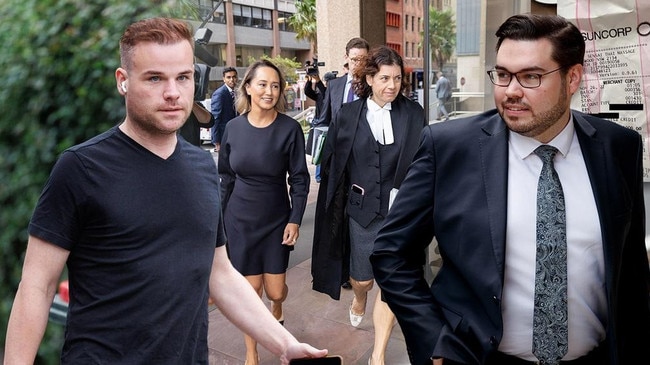
There was no reason to shut down the live streaming. That horse had bolted; the case had already been aired to the public for 22 days. Still, Matt Collins SC, who acted for Ten, offers a sober note of caution about the live streaming well before Auberbach’s surprise appearance.
The high-profile Melbourne silk told Inquirer this week that while the decision to livestream the Lehrmann case was a perfectly rational decision, “it involved the live stream of what was, in substance, a rape case. That meant not only was it in the public interest but it was interesting to the public and it was salacious.”
Collins is also uncomfortable with the heightened attention on barristers. “If you’re sitting in the courtroom, you get the formality of it. If you’re sitting at home eating popcorn and watching it on YouTube, it looks rather a lot like a very long, poorly acted reality TV show,” he says.
In a thoughtful speech in October 2024, Collins spoke of barristers becoming part of the story. During the Lehrmann matter, he said that on social media: “All of us copped it, although no one as much as Lehrmann’s senior counsel.”
Collins was accused of being a pervert when cross-examining Lehrmann. One of Lehrmann’s legal team, Steve Whybrow SC was accused of far worse. He was accused on social media of questioning Higgins with an aim to dissuade women from coming forward with allegations of sexual assault. It was terrible slander.
“The scrutiny to which we were subjected exceeded that which I have seen in any other case in my 25 years at the bar. Interactions with the bench that are just part and parcel of day-to-day advocacy, and which we all understand involves the usual testing of propositions, were amplified and misrepresented as criticisms of our conduct online,” Collins said.
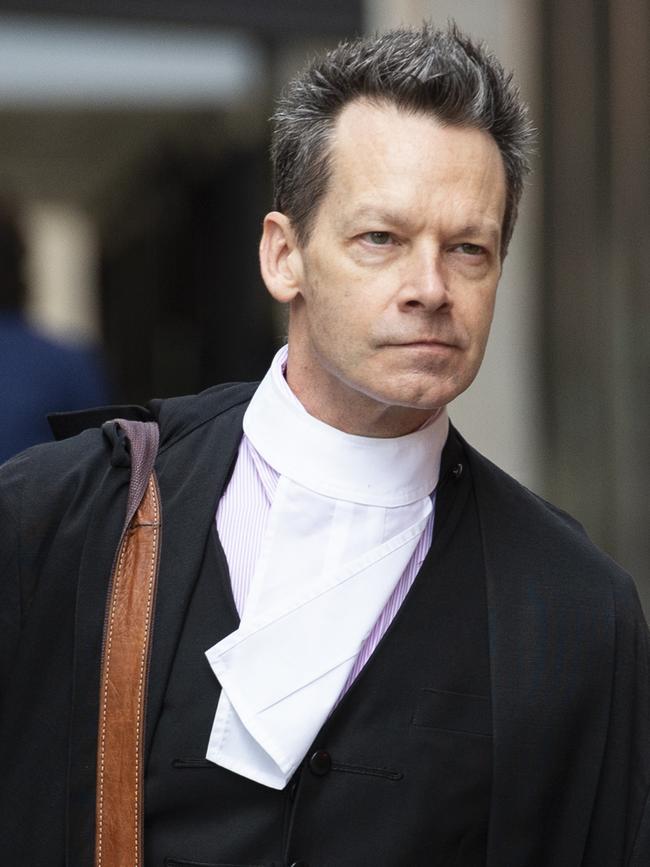
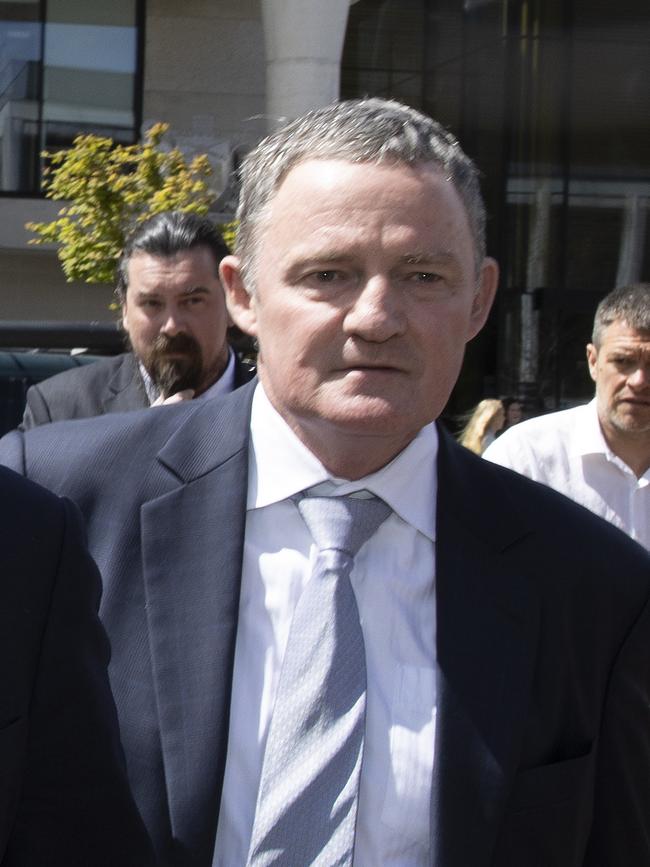
Collins gave that speech soon after he appeared for John Pesutto, squaring off against Chrysanthou, who represented Victorian MP Moira Deeming in the notorious defamation case that now threatens to bankrupt the former Victorian Liberal leader. During that three-week live-streamed case, Collins became the target of ill-informed quips – and serious death threats. Collins told the Australian Lawyers Alliance conference that one pundit tuning into the live stream said “the simmering tension between Collins and SC (Chrysanthou)” was “the “best part” of the proceedings. Collins pointed out he was gay.
Fifteen minutes into his opening address came the death threat. Ten minutes later Collins’s secretary “received a call from a person asking whether her boss enjoys abusing women and whether he watches troon porn with his faggot boyfriend”.
“It is easy to understand, of course, why a trial of this kind concerns matters of public interest, and is at the same time, interesting to the public,” Collins said.
“It involved an airing, in open court, of divisions within the alternative government of the state. It examined a notorious incident in the life of the city, when neo-Nazis invaded the heart of Victoria’s democracy. It explored one of the key fronts in Australia’s ongoing culture wars – the tension between those advocating for rights for trans and gender-diverse individuals on the one hand, and those demanding rights for women based upon their biology at birth.
“However, like Lehrmann, it seemed to me that the streaming of the case at times converted a serious trial, with vital interests at stake on both sides, into a form of public entertainment in which members of the public were invited to barrack for one side or the other.”
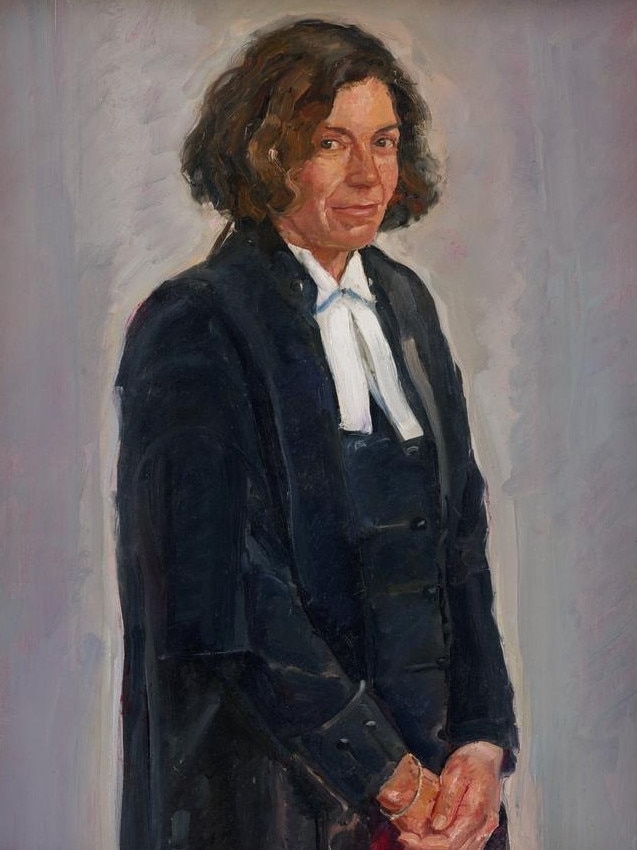
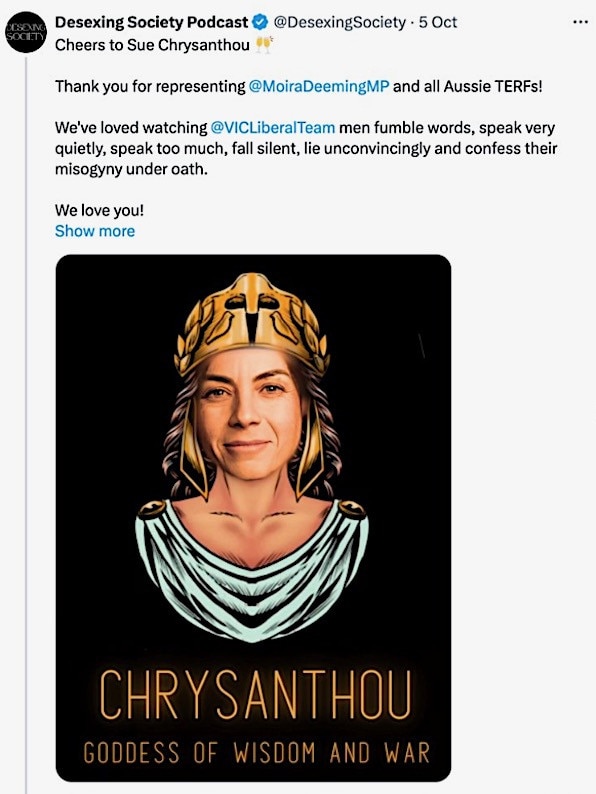
Proving the pop culture attraction of defamation lawyers, a portrait of Chrysanthou features in this year’s Archibald Prize. The artist, Peter Wegner, said he tuned in to watch the Deeming legal drama – at No 7 with 11,515 viewers at its height. “It was at that moment that l considered painting her portrait.”
In the Lehrmann case, Collins – on behalf of his client, Network Ten – opposed the live streaming. But he says in the end it was a success “because it enabled the public to see our justice system in action and working well”.
“Lee managed the trial in an efficient and impressive manner, always with an eye to ensuring that justice was done, and was seen to be done, openly,” Collins told the Perth conference.
Lee had opened the court so the nation could finally see a matter of fundamental public interest resolved: was there a political cover-up that warranted Labor weaponising a rape allegation to help bring down a government. Lee found no evidence to support it.
That left Ten and Wilkinson bruised, even in victory.
Higgins didn’t escape either, with Lee describing as “untrue” some of her allegations in her statement of claim, which secured $2.4m from taxpayers.
Proving that cameras were not necessary for a witness to be heard right across the country, former Liberal staff member Fiona Brown was the real star of the trial. Her evidence was not live-streamed because of health issues. Lee vindicated Brown, accepting her evidence over that of Higgins and finding allegations that Brown covered up a rape were false.
Lee’s three-hour live-streamed judgment attracted more than 40k distinct views. The court’s official numbers don’t capture many thousands more who likely watched broadcasts of the judgment on Sky News and other media outlets. In one large Australian law school lecture room, just about every student with AirPods had their laptop opened to Lee’s judgment.
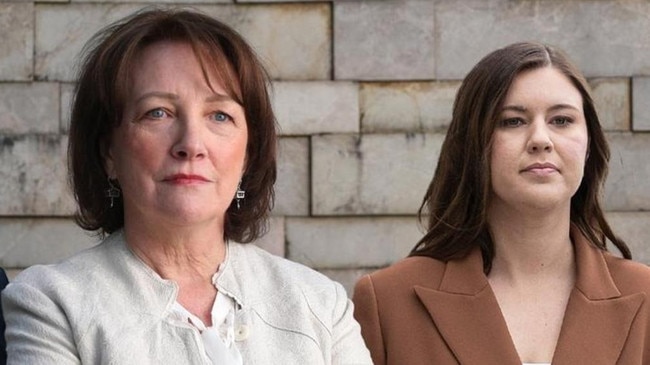
Still, Collins has called for protocols “outlining the guiding principles for determining which cases will be live-streamed” with submissions invited from parties.
In an important speech in February, Federal Court Chief Justice Debbie Mortimer also mentioned concerns about the effects of live streaming on witnesses, lawyers and judges. Witnesses, especially in high-profile cases, might forget that “your true audience is the judge” – not the thousands of people watching the live stream.
Lawyers might feel the “pressure to ‘win’ the battle for headlines in the next day’s reporting or social media commentary”, she said.
“Might judges who are gregarious, who perhaps consider themselves witty and enjoy the banter between bench and bar table, be encouraged (by live streaming) to produce quips that might not otherwise be uttered?” Mortimer asked. “We can agree, I trust, that seeing the courtroom as a place for entertainment creates altogether the wrong impression of the court at work.”
Those comments about judges raised eyebrows – and questions – within the legal profession. Some have raised with Inquirer the question of whether the Chief Justice was having a go at one of her Federal Court justices. Was she alluding to Lee?
High-profile Sydney silk Arthur Moses SC, who has appeared in a number of live-streamed legal cases, told Inquirer that he had never seen any judges “perform” for the wider audience. “Explaining matters in plain terms for the benefit of the public is not entertaining but rather explaining steps being taken in the justice system. If anything, live streaming may promote better conduct by judges in the courtroom as their behaviour is on display to the public who they are ultimately accountable to.”

Asked about Lee, Moses told Inquirer: “Justice Lee’s conduct in his courtroom of back-to-back high-profile cases has been exemplary. It has reinforced confidence in the justice system.”
Live streaming of our legal system should ignite robust debates – especially within the profession. Technology is a double-edged sword. And as one would expect, not all lawyers – or judges – see eye-to-eye.
Moses says he disagrees, respectfully, with those who say the discomfort of lawyers should trump open justice.
“In order to promote public confidence in the administration of justice, it is important that proceedings be accessible to members of the public who wish to observe proceedings,” he says. “At the end of the day … as barristers we represent a range of clients, from the powerful to the disenfranchised. Some clients may not be popular. Some clients have been accused of awful behaviour. But the role of the barrister is constant.
“We represent those clients without fear or favour in order to ensure that he or she receives a fair trial. Regrettably, that sometimes involves having to state matters which are unpleasant or which are uncomfortable for witnesses.
“That may attract negative commentary, but the role of the lawyer is not to focus on what is happening with commentary outside the courtroom but what is happening in the courtroom.”
In an increasingly polarised and emoting world, that may be easier said than done.






To join the conversation, please log in. Don't have an account? Register
Join the conversation, you are commenting as Logout